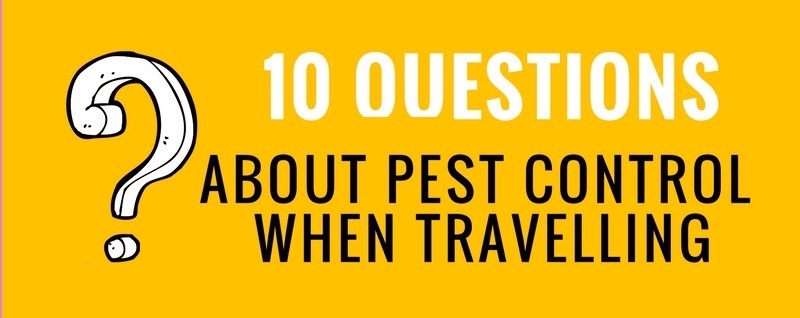Travel guide books give you an extensive list of things to see and do, but rarely give you a guide on pest control when travelling. Here are our answers to the top 10 questions people ask us before going on holiday. Make sure you have all the right knowledge so that you don’t end up bringing any pests, or their diseases, home with you. There are plenty of things you can do to make your travels free from unwanted holiday pest control issues. Here are our top 10 tips…


Travel & Holiday Pest Control Watch List
ARE BED BUGS EASY TO SPOT BY JUST LOOKING?
If you stumble into a guest house or even a posh hotel, you may unknowingly be getting up close and personal with bed bugs. However, you’re much more likely to be bitten by a bed bug than you are to see one.
HOW DO BED BUGS GET BROUGHT BACK HOME?
Over the last few years bed bugs have increased their geographical reach, so you can find them in almost anywhere. If you aren’t careful enough, you might end up carrying a few of these insects with you in your luggage because they are renowned for getting into suitcases and holdalls.
HOW CAN I REDUCE THE RISK OF HITCHHIKERS?
Keep luggage and other personal items off the floor. If there is a luggage rack, use it, but make sure it’s free of pests first. Suitcases shouldn’t be put on the bed. And if possible, wash all your clothes on hot before packing to return home.
SHOULD I BE WORRIED ABOUT RATS ABROAD?
You might be having your holiday in a big city, and if so you are quite likely to spot an urban rat. Be aware that when some types of rats are cornered they can attack. Plus they carry some pretty nasty diseases, so keep your distance.
I KNOW ABOUT WASPS BUT HOW ABOUT BEES?
Everyone thinks of bees as the good guys, the peaceful pollinators and producers of honey. However, some foreign bees can be a lot more aggressive than the UK bumblebee.
Some Pests Are Not To Be Messed With
MOSQUITOS: ARE THEY REALLY DANGEROUS?
I think everyone who has ever been abroad has probably been bitten by a mosquito. You need to be aware of the specific area’s local mosquitoes, because some can carry deadly diseases, depending what country you’re in.
AVOID FOOD POISONING ON YOUR TRAVELS…
With the presence of cockroaches comes the risk of food poisoning and other diseases too. If you’ve spotted cockroaches at a local stall or restaurant, your best bet would be to avoid eating or drinking anything from there.
WHAT ABOUT SAFETY & STINGING INSECTS?
Many people have wasp sting allergies, so being stung can be very dangerous or even fatal. Avoid bright colour clothes, don’t wear scented products. Use a natural repellent and stay away from sweet food and drinks outdoors.
HOW DO I KNOW WHAT SPIDERS ARE HARMFUL?
Before setting off on your travels, research the places you intend to visit to find out what spiders and other insects they have that might be a risk. Go as far as buying a visual guide to these insects to carry with you on excursions.
PROTECT YOURSELF FROM BITING INSECTS…
Always wear long sleeves and socks at dusk, opt for closed toe shoes and trousers in long grass to avoid tick bites which can carry Lyme disease. Consider sleeping under insect netting.






